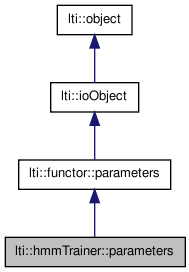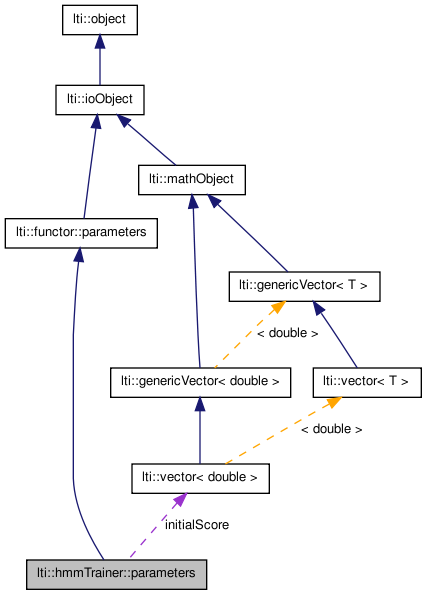

|
latest version v1.9 - last update 10 Apr 2010 |
|
the parameters for the class hmmTrainer More...
#include <ltiHmmTrainer.h>


the parameters for the class hmmTrainer
| anonymous enum |
Estimator types:.
| estimMaximumLikelihood |
select estimator for given score function (default) |
| estimStandardDeviation |
standard deviation (gaussian maximum-likelihood) |
| estimMeanDeviation |
mean absolute deviation (laplacian maximum-likelihood) |
| estimMeanDeviationRoot |
root of mean absolute deviation (laplacian maximum-likelihood) |
| lti::hmmTrainer::parameters::parameters | ( | ) |
default constructor
Reimplemented from lti::functor::parameters.
| lti::hmmTrainer::parameters::parameters | ( | const parameters & | other | ) |
copy constructor
| other | the parameters object to be copied |
| lti::hmmTrainer::parameters::~parameters | ( | ) | [virtual] |
destructor
Reimplemented from lti::functor::parameters.
| virtual functor::parameters* lti::hmmTrainer::parameters::clone | ( | ) | const [virtual] |
returns a pointer to a clone of the parameters
Implements lti::functor::parameters.
| parameters& lti::hmmTrainer::parameters::copy | ( | const parameters & | other | ) |
copy the contents of a parameters object
| other | the parameters object to be copied |
| const char* lti::hmmTrainer::parameters::getTypeName | ( | ) | const [virtual] |
returns name of this type
Reimplemented from lti::functor::parameters.
| parameters& lti::hmmTrainer::parameters::operator= | ( | const parameters & | other | ) |
copy the contents of a parameters object
| other | the parameters object to be copied |
| virtual bool lti::hmmTrainer::parameters::read | ( | ioHandler & | handler, | |
| const bool | complete = true | |||
| ) | [virtual] |
read the parameters from the given ioHandler
| handler | the ioHandler to be used | |
| complete | if true (the default) the enclosing begin/end will be also written, otherwise only the data block will be written. |
Reimplemented from lti::functor::parameters.
| virtual bool lti::hmmTrainer::parameters::write | ( | ioHandler & | handler, | |
| const bool | complete = true | |||
| ) | const [virtual] |
write the parameters in the given ioHandler
| handler | the ioHandler to be used | |
| complete | if true (the default) the enclosing begin/end will be also written, otherwise only the data block will be written. |
Reimplemented from lti::functor::parameters.
Estimation of the HMM parameters is finished, when score enhancement within one iteration is below or equal to convergence threshold for given training data.
Default is 0.0 (iterate, while model score is improving)
Method for estimating the scaling factor (ie spread) of the density functions.
Default: estimMaximumLikelihood
Number of iteration, where splitting is taken into consideration for the first time.
By default, this is set to 0.
Maximum allowed number of densities per state.
Default = 5
Maximum relative forward jump within HMM.
Default: 2
Maximum number of training iterations.
Default is 0 (iterate, until convergenceThreshold is reached).
Minimum number of observations assigned to a density to be splittable.
Default: 3
Minimum relative forward jump within HMM.
Default: 0 , i.e. loop to current state
Minimum scaling factor.
This is required to avoid very narrow and high density functions, which are obtained, when variation in data is too little.
Default is 0.1
Number of states of the model to be generated.
A value of minimumSequenceLength (0) indicates to pick the size of the shortest observation sequence, averageSequenceLength (-1) picks the average size of all considered observation sequences.
Default: minimumSequenceLength (0)
Pooling means to compute a common scaling factor (spread, variance) for several densities.
You can select to have no pooling, state pooling or model pooling.
Default: noPooling
Number of iterations between two split processes.
A value of 0 will reassign observations until no further changes occur (nope, not yet!).
The default value is 5 (split densities at every 5th iteration).
Density function type to be used for the emission scores.
Default: laplaceScore